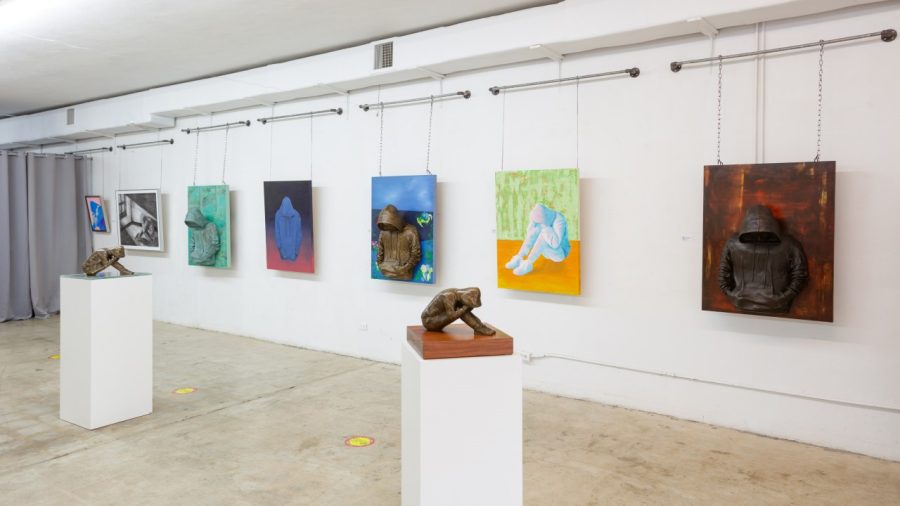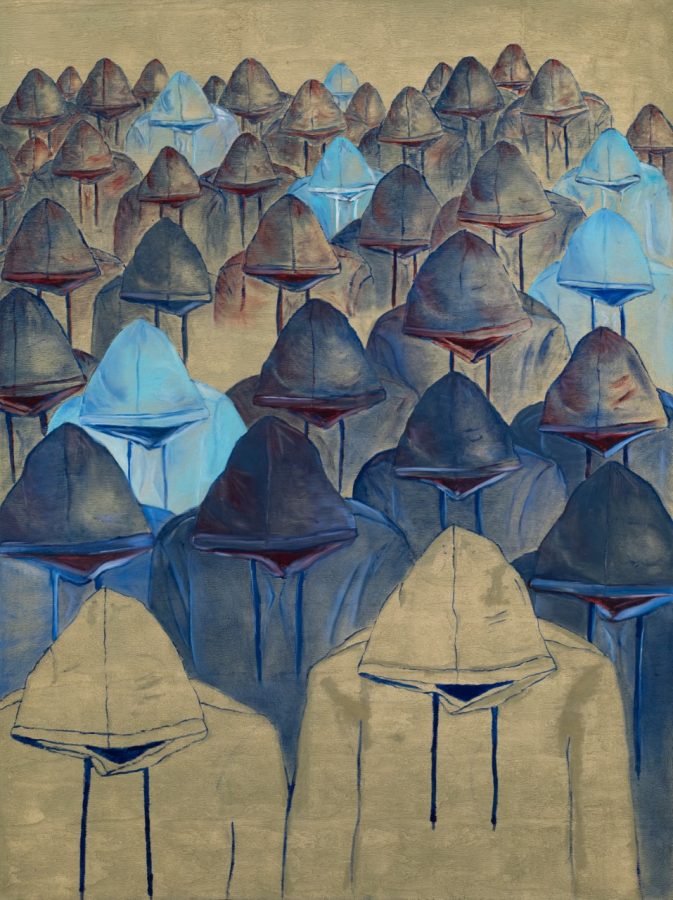NU alum uses art for advocacy at local gallery
Domenic Esposito’s January exhibit at Piano Craft Gallery features 35 pieces raising awareness for substance use disorders. Photo courtesy of Roberta Tsang.
February 2, 2022
In Domenic Esposito’s exhibit, a faceless, hooded figure looms in each piece. In one painting, a wall of hoods face forward. In another, a series of them approach the foreground until a bronze statue breaks through the canvas.
Esposito’s January exhibit at Piano Craft Gallery features 35 pieces raising awareness for substance use disorders.
Domenic Esposito, a Northeastern alum, leaves the hooded figure’s identity up to interpretation. Its role as an emblem of the dark, draining impacts of drug addiction, however, remain clear.
“I want people to feel the isolation and loneliness, to put themselves in their shoes,” Domenic Esposito said. “At the end of the day, it’s about creating empathy for those people.”
The exhibit, which ran Jan. 7 to Jan. 30, is titled “Vox Clamantis,” a Latin phrase meaning “a cry of help.”
“It’s my cry for help for a community that I think is overlooked,” Domenic Esposito said.
In 2020, 2,106 people died of opioid-related overdoses in Massachusetts, according to the Massachusetts Department of Public Health.
Domenic Esposito knows the effects of substance use disorder. His brother, who is currently in rehabilitation, has struggled with addiction for 12 years.
“My mom would call and tell us that she found another dark spoon in the house,” he said.
Domenic Esposito first made national headlines in 2018 when he placed a 10 ft. long, 800 lb. spoon sculpture at the headquarters of Purdue Pharma to protest their role in the opioid crisis.
Thus, the Opioid Spoon Project was born. Since then, he has left spoon sculptures at three other pharmaceutical headquarters in New Brunswick, Washington D.C. and Rhode Island, and the project has become a 501(c)(3) registered charity.
“It was sort of out of this rage,” Domenic Esposito said. “I wanted to do guerilla art that was really focused on pointing fingers at those responsible.”
Domenic Esposito graduated from Northeastern University in 1993, where he was enrolled as a business administration major. But an elective photography class soon changed his career trajectory.
“I took it so seriously and I really enjoyed it,” Domenic Esposito said. “As a business major, my art was on display in a gallery.”
After graduating, Domenic Esposito did an art residency at Mana Contemporary in New Jersey.
His wife and high school sweetheart, Monica Esposito, graduated from Northeastern in 1994. She studied finance and international business, and today helps organize and fundraise for the Opioid Spoon Project. The couple is now based in Westwood, Mass.
“I don’t think either of us really saw ourselves in this non-profit world, but as you go through life and as things happen, as you mature,” Monica Esposito said. “Our nature is to take action.”
The Espositos’ approach to the Opioid Spoon Project, as well as the recent art exhibit at Piano Craft, is honesty and transparency, they said. Domenic Esposito has openly shared his brother’s struggle with substance use disorder with the media.
“As a society, we tend to hide what’s going on in our families, healthwise,” Domenic said. “We made a decision, Monica and I, that at the start, we were going to be so transparent. We’re just showing people who we are.”
The “Vox Clamantis” exhibit is intended to do just that, and evoke “charged, visceral” feelings, he said. The usage of bronze in several pieces is intended to reflect the heavy subject matter, while the placement of the pieces’ title plaques on the floor “forces you to bow” as you approach them. Domenic Esposito’s other techniques include oil painting, cold wax and sand casting.
“I don’t think people realize how diverse he is,” said Christine O’Donnell, owner and director of Beacon Gallery in SoWa Boston, where Domenic will show his work in June alongside artists Nikki Sevier Vyuk and Sharon Whitham. “Seeing the work coming alive is so fulfilling.”
On Jan. 21, the Opioid Spoon Project hosted a fundraiser at Piano Craft Gallery, largely organized by Monica Esposito. The raised money will finance Domenic Esposito’s next work: the Memorial Doors Project. The three-dimensional bronze door — which will be displayed in a public setting — will memorialize those who have passed away from drug addiction.
With “Vox Clamantis” now closed, the Memorial Doors Project is Domenic’s main focus until it is displayed this summer.
The Espositos said they hope their work inspires others to get involved. They recommend volunteering at a pre-existing nonprofits, especially with the current labor shortage. Ultimately, taking action is crucial, Monica Esposito said.
“If you’re passionate about a cause, or you want to see change, you can’t just sit down, you have to get into the frontline and show up and see what you can do,” Monica Esposito said.







